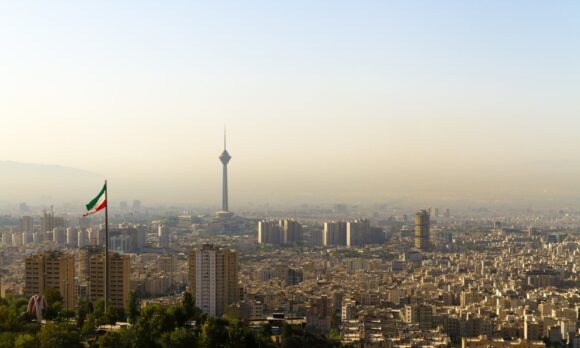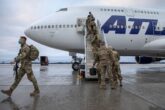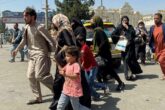September 08, 2021
Sharper: Afghanistan 20 Years Later
Analysis from CNAS experts on the most critical challenges for U.S. foreign policy.
The chaotic end to the war in Afghanistan bookends two decades in which America changed irrevocably. Thousands of soldiers experienced dual wars, and multiple generations of veterans returned home to new challenges. Domestically and abroad, the war on terror unfurled in vast ways. Twenty years later, though, the United States has only begun to grapple with critical questions about what went wrong in Afghanistan, the future threat of terrorism, and the impact of U.S. national security policy. CNAS experts have sharpened the ongoing conversation on American national security in a post-9/11 world. Continue reading this edition of Sharper to explore their ideas and recommendations.
Features
Enhancing DHS Oversight and Accountability
Created in 2002 after the 9/11 attacks, the Department of Homeland Security (DHS) is a sprawling agency with a wide array of responsibilities ranging from counterterrorism to physical security to cybersecurity to emergency response. As the implementation of these functions has grown in complexity, the oversight and accountability mechanisms for specific DHS activities by the executive and legislative branches have struggled to keep pace. To address these challenges, CNAS launched a project led by Carrie Cordero to review and provide guidance for the development of recommendations concerning three main aspects of DHS functions.
Veteran Pathways to Employment: Hurdles and Opportunities
The issue of employment for post-9/11 veterans came to a head nearly a decade ago, when the national economy was ailing and a spike in veteran unemployment coincided with the height of the wars in Iraq and Afghanistan. Following the first nine years of war in Afghanistan and Iraq, the well-being of the veteran community was a major public concern. Authors Dr. Jason Dempsey and Amy Schafer explain where civilian sector efforts can make a positive difference in veteran transition outcomes, and offer several areas where coordinated efforts from the private sector could create strong pathways to meaningful employment for post-9/11 veterans.
Focused Engagement: A New Way Forward in Afghanistan
In a paper published in 2017, CNAS Adjunct Senior Fellow, and retired Army commander Christopher Kolenda wrote, "Afghan President Ashraf Ghani and Chief Executive Abdullah Abdullah want reform, but have differing visions and their administration is too divided to act decisively. The Afghan government remains unable to win the battle of legitimacy in contested and Taliban controlled areas. A successful end to the war is nowhere in sight. The United States bears its share of the blame. Micromanagement from Washington has led to damaging bureaucratic silos, sluggish decision-making, and a host of implementation problems that have amplified the problems above and fed local perceptions that the United States does not want peace in Afghanistan."
Enhancing DHS Oversight & Accountability
Created in 2002, the Department of Homeland Security (DHS) is a sprawling agency of more than 240,000 employees with a wide array of responsibilities ranging from counterterro...
Veteran Pathways to Employment: Hurdles and Opportunities
Introduction and Executive Summary The issue of employment for post-9/11 veterans came to a head nearly a decade ago, when the national economy was ailing and a spike in veter...
Focused Engagement
The war in Afghanistan was a topic largely absent from the 2016 U.S. presidential election. In 2012 and 2013 Donald J. Trump referred to Afghanistan as a “complete and total d...
Special Events
Against the Clock: Saving America's Afghan Partners
With no embassy in Kabul and a difficult bureaucratic process to navigate with few resources, what must happen next for Afghans left in limbo? On Thursday, August 19, the Center for a New American Security hosted an urgent discussion on the status of U.S. efforts to relocate nearly twenty thousand special immigrant visa (SIV) applicants and their families, and lessons learned from past experiences. Guests included Rep. Seth Moulton, Amb. Richard Armitage, and Lisa Curtis. Moderated by CNAS CEO Richard Fontaine.
From Frozen Assets to Sanctions: What Economic Leverage Does the U.S. Have in Afghanistan?
Will sanctions and other coercive economic be enough to compel the Taliban to follow international standards on human rights? What role will the informal economy and support from non-democratic states have in reducing the American economic leverage over the Taliban? How will these restrictions impact the population and the humanitarian efforts that the U.S. and allies have been supporting? On Tuesday, August 24, CNAS hosted a discussion on these pressing questions with experts guests Annie Pforzheimer, Alex Zerden, Rachel Ziemba. The event was moderated by Emily Kilcrease, Senior Fellow and Director of the Energy, Economics, and Security Program.
Special Event | Against the Clock: Saving America's Afghan Partners
Richard Fontaine, Richard L. Armitage, Lisa Curtis, Rep. Seth Moulton
Aug 19, 2021
Virtual Event | From Frozen Assets to Sanctions: What Economic Leverage Does the U.S. Have in Afghanistan?
Alex Zerden, Annie Pforzheimer, Rachel Ziemba, Emily Kilcrease
Aug 24, 2021
Commentaries
From Forever Wars to Great-Power Wars: Lessons Learned from Operation Inherent Resolve
"The war to defeat the Islamic State in Iraq and the Levant (ISIL), known as Operation Inherent Resolve, presented one of the most permissive operating environments U.S. airpower could expect," write Stacie Pettyjohn and Becca Wasser in War on the Rocks. "Issues that emerged in this environment are likely to be far more acute against a more capable adversary. American military operations in the Middle East highlighted clear deficiencies in some missions that would be essential to winning a future great-power conventional war. U.S. forces should address the vulnerabilities identified during this conflict related to deliberate targeting, operating in contested airspace, and integrating air- and ground-based fires to prepare for future great-power conflict."
Take Time to Judge Taliban’s Actions, Not Words
"There’s good reason to be suspicious of the Taliban claims of amnesty," observes Lisa Curtis in Just Security. "It’s only been two weeks since the Taliban assassinated the former Afghan government state media chief as part of a systematic campaign to assassinate government officials, civil society leaders, human rights activists, and journalists. Indeed, I have argued that the United Nations should sanction senior Taliban leaders for those atrocities. Taliban leaders may have decided to declare amnesty for government officials because they recognize they need some bureaucrats to keep the wheels of government turning. It is unclear how the Taliban will treat those workers once they resume their duties."
The American Public Wants a Sustainable Middle East Policy
"America must right-size its approach to the Middle East in a sustainable way rather than continuing the yo-yo approach of the last two decades," argue Kaleigh Thomas and Emma Moore for War on the Rocks. "The U.S. has been a regional security leader in the Middle East for decades, but the political and public appetite for the role has waned as American success in this position has come into question. But the American public believes the United States still has interests in the region—primarily preventing the export of terrorism from the region and the spread of nuclear weapons within it. A smaller and predictable presence can satisfy the public’s concerns while also supporting partners in the region and reducing the strain on the force."
From Forever Wars to Great-Power Wars: Lessons Learned from Operation Inherent Resolve
It is important that the Pentagon does not relegate the lessons learned from its recent operational experience in the Middle East to the trash bin....
Take Time to Judge Taliban’s Actions, Not Words
The United States and its like-minded partners must condition diplomatic recognition on the Taliban meeting human rights and counterterrorism standards....
The American Public Wants a Sustainable Middle East Policy
After the U.S. strike on Qasem Soleimani, Americans feared the United States was on the brink of war with Iran. “World War III draft” memes circulated around the internet, and...
Can America Trust the Taliban to Prevent Another 9/11?
"For nearly 20 years, the U.S. intervention in Afghanistan has been sustained by a single, vital national interest: the clear and present danger of another September 11–like attack emerging from this region of the world, absent constant efforts to thwart it," write Gen. David Petraeus and Vance Serchuk in Foreign Affairs. "To this end, U.S. strategy has been threefold: deploying American and allied forces to Afghanistan to conduct sensitive counterterrorism missions there and in neighboring parts of Pakistan; training and enabling Afghan partner forces to assume the bulk of responsibility for security inside their country; and backing a friendly government in Kabul that has permitted international forces to operate from its territory against Islamist extremism."
Why America Can’t Build Allied Armies
"What the military calls 'security force assistance,' 'building partner capacity,' or 'train-and-equip operations' remains a pillar of U.S. defense strategy. Setting Afghanistan and Iraq entirely aside, the United States spends billions of dollars every year and deploys thousands of personnel to train and assist foreign militaries from countries all over the world," observes Rachel Tecott in Foreign Affairs. "Although the purpose of such assistance varies, its main goal is to increase the capacity of partner militaries to shoulder local security burdens so that the United States can shift its own resources to higher priorities. The problem, however, is that the United States’ partners are often uninterested in building militaries that can fight."
What Is Known About ISIS-K Funding in Afghanistan?
"The Taliban’s takeover of the Afghan government creates serious difficulties for the U.S. and the international community to combat terrorism financing in general, and against ISIS-K in particular. Even though the Taliban considers ISIS-K as a sworn enemy, several factors likely prevent a robust counterterrorism financing response to ISIS-K in the near term," writes Alex Zerden for Lawfare. "First, the current instability creates a vacuum for ISIS-K to operate. Second, the Taliban’s capabilities and willingness to govern remain unknown; the Taliban now controls and supervises the banking and hawala industries, and oversees Afghanistan’s central bank and its Financial Intelligence Unit. How it handles that role, and what pressure it can put on groups like ISIS-K, is far from clear, especially as it has used the hawala system to move money for its own militants as late as 2020."
Can America Trust the Taliban to Prevent Another 9/11?
For nearly 20 years, the U.S. intervention in Afghanistan has been sustained by a single, vital national interest: the clear and present danger of another September 11–like at...
Why America Can’t Build Allied Armies
The United States’ partners are often uninterested in building militaries that can fight....
What Is Known About ISIS-K Funding in Afghanistan?
The horrific Aug. 26 complex attack against Afghan civilians and U.S. Marines at the Kabul airport has put international attention on the Islamic State in Khorasan (ISIS-K), a...
In the News
Featuring commentary and analysis by Lisa Curtis, Richard Fontaine, Jason Dempsey, and Robert D. Kaplan.
In Afghan Withdrawal, a Biden Doctrine Surfaces
In the chaotic finale of America’s 20-year war in Afghanistan, a Biden Doctrine is emerging: a foreign policy that avoids the aggressive tactics of forever wars and nation bui...
Afghanistan chaos tests Democrats’ opposition to US military intervention
“Now that America’s participation [in Afghanistan] is ending on such a negative note, there may well be a rethinking of the balance between US action and non-intervention,” Ri...
Military Analyst: U.S. Trained Afghan Forces For A Nation That Didn't Exist
NPR's Don Gonyea speaks with analyst Jason Dempsey about why, after years of U.S. military training and billions of dollars, the Afghan military has proven unable to stand up ...
The Forever War: 20 Years After 9/11
The Listening Post interviews Robert Kaplan as it looks at the climate of fear that undergirded the so-called “War on Terror” and how the US news and entertainment industries ...
About the Sharper Series
The CNAS Sharper series features curated analysis and commentary from CNAS experts on the most critical challenges in U.S. foreign policy. From the future of America's relationship with China to the state of U.S. sanctions policy and more, each collection draws on the reports, interviews, and other commentaries produced by experts across the Center to explore how America can strengthen its competitive edge.
Subscribe
Sign up to receive the latest analysis from the CNAS expert community on the most important issues facing America's national security.
Thank you for registering! You will receive a confirmation email shortly. All CNAS events are free, open to the public, and viewable from cnas.org/live.
Stay up-to-date with report releases, events, major updates, and announcements from the Center for a New American Security.
More from CNAS
-
Afghanistan: Why Does Trump Want to Retake Bagram Air Base?
Lisa Curtis, senior fellow and program director at the Center for a New American Security joined Deutsche Welle to discuss President Trump's comments on the U.S. regaining con...
By Lisa Curtis
-
A Failure to Plan: Examining the Biden Administration’s Preparation for the Afghanistan Withdrawal
Afghanistan, Iraq, and Vietnam. One failure is a horrible accident; two failures are a tragic coincidence; three failures are a disturbing trend that shows the U.S. government...
By Christopher D. Kolenda
-
Against All Odds
Eighteen months after taking power, the Taliban is intensifying its repression of Afghan civil society and cracking down on the rights and freedoms of all Afghans, especially ...
By Lisa Curtis, Annie Pforzheimer & Jan Mohammad Jahid
-
To Help Afghanistan, Engage Its Political Opposition
The effort to help Afghans shape a better alternative should begin now....
By Richard Fontaine & Lisa Curtis

















